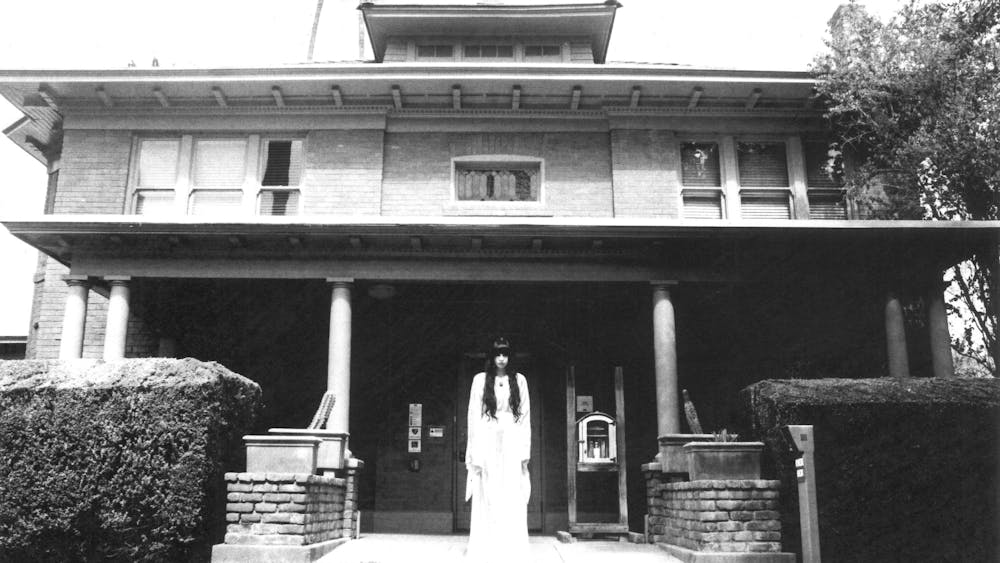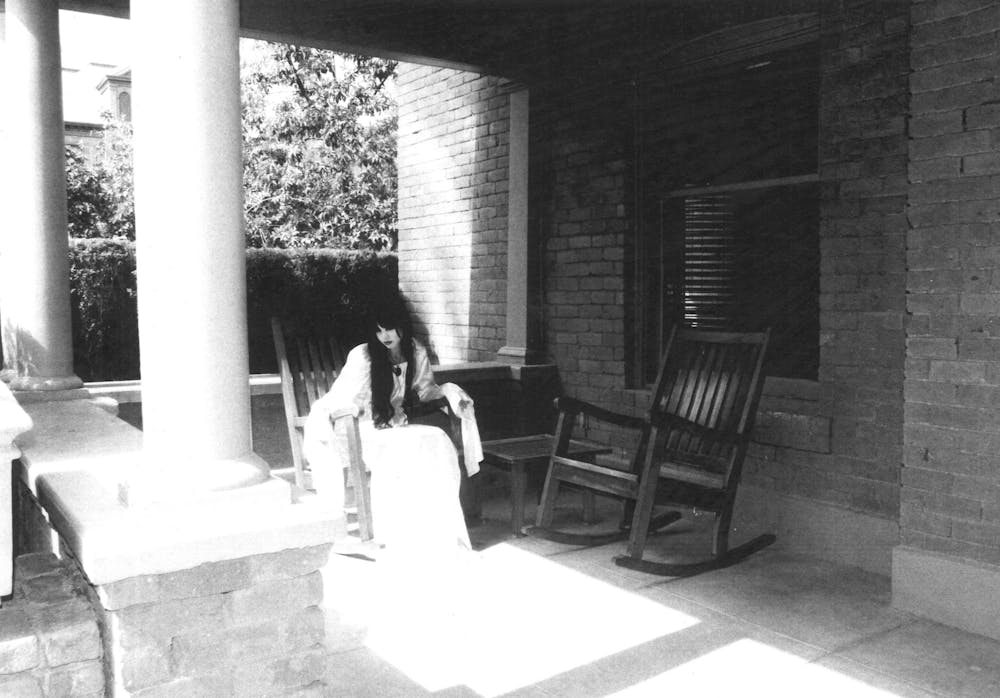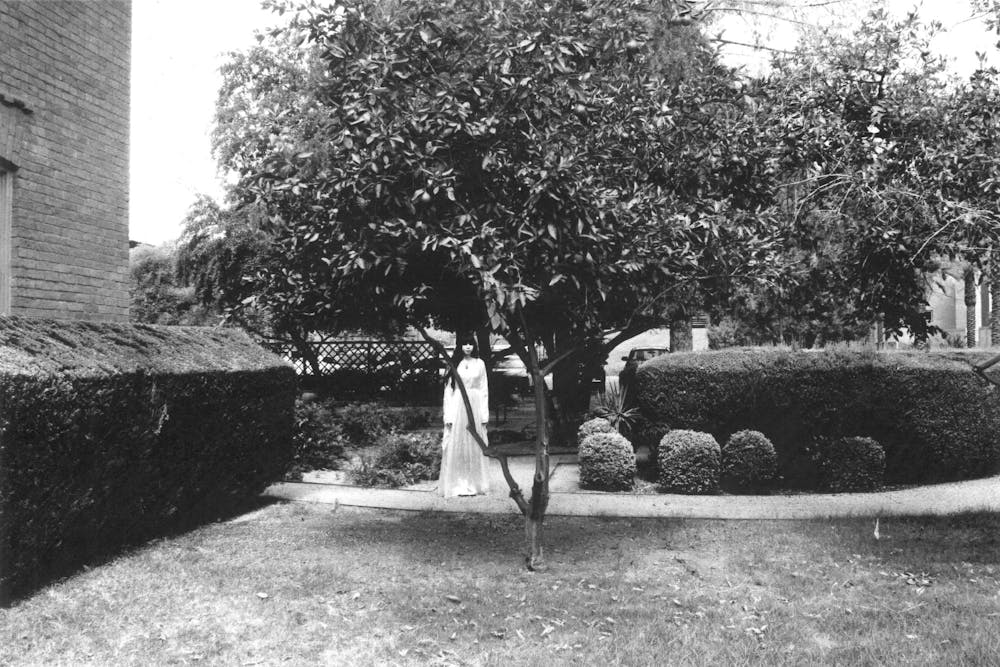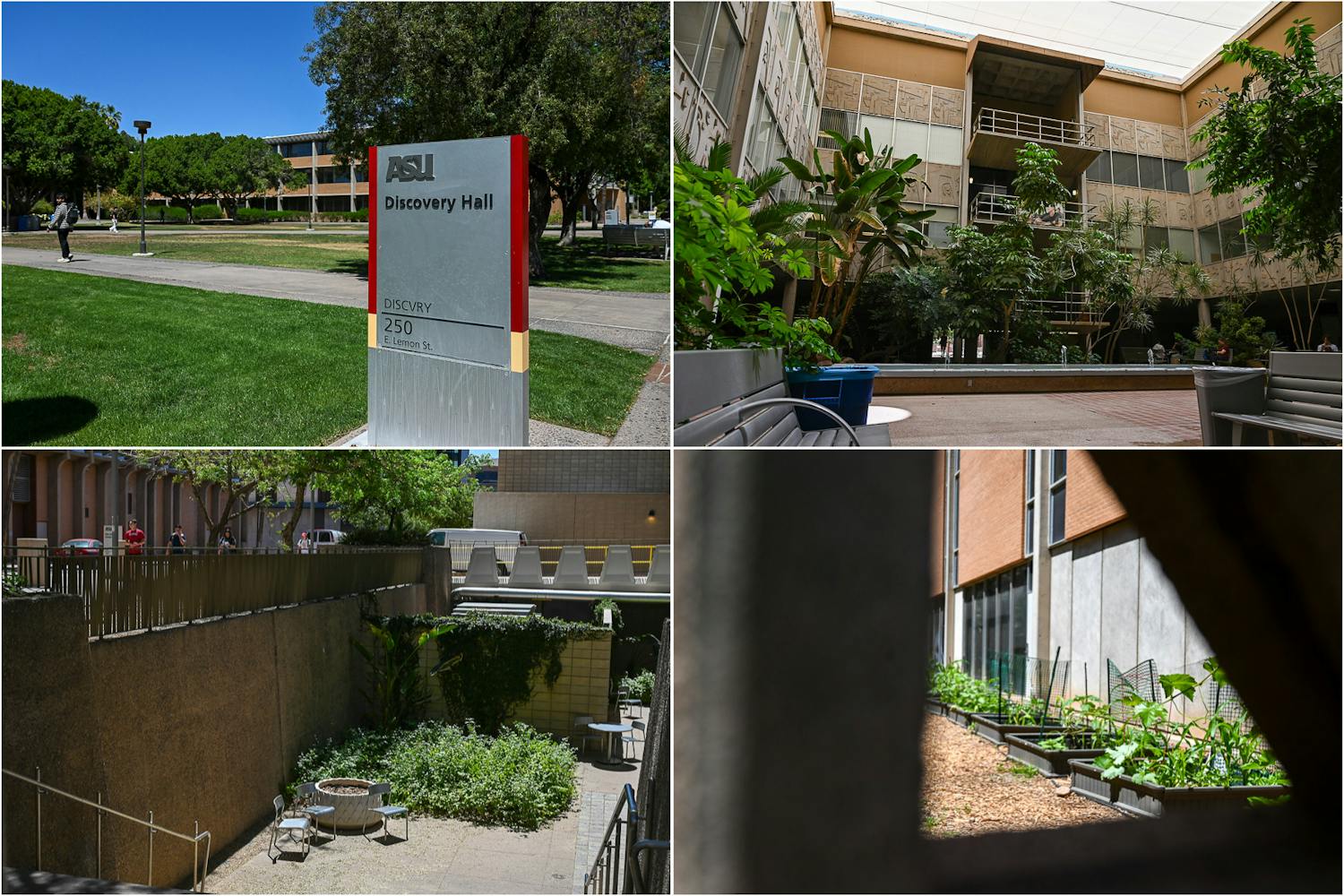Listen to the article:
At first, I thought I was imagining it.
The shadow that passed through my peripherals was just that — a shadow. I blamed it on the dying light bulbs reflecting off haphazardly arranged furniture. I didn't have time to entertain supernatural possibilities.
I continued my student worker tasks, distracting myself with music and fixing my eyes on my computer. The room was incessantly warm. The hot Arizona weather always found a way to creep in through the thin walls. That's why it caught my attention when my skin tightened and the tip of my nose grew numb — the temperature dropped unnaturally fast.
A sixth sense kicked in. I was acutely aware of something I didn't believe in. The sound of my heartbeat amplified, drowning out the rhythm of my music. A sharp ringing pierced my ears causing me to stop what I was doing.
I felt an overwhelming urge to look behind me. To my surprise, nothing was there, but my body told me there was.
At that moment, a cynic started to believe. I heard stories about buildings on campus being haunted, but I never expected to have an encounter of my own.
Community Services Building
Tuberculosis is a fatal lung infection spread through airborne bacteria. More than 80% of people who contract tuberculosis will die. "The infected" die from coughing up blood until their bodies are inevitably ravaged by the disease.
In the 1960s, people with tuberculosis were housed in what is now the Community Services Building located on the corner of Curry Road and Mill Avenue.
After its time as a tuberculosis sanatorium, the building was assigned a new purpose: Arizona's first children's hospital. Instead of tuberculosis patients, sick children occupied the 60-room building. The ghosts of tuberculosis patients and children who died are said to still roam the halls.
"I went to the bathroom upstairs on the second level, and I was by myself, and I heard little kids laughing, but it was six o'clock at night, so there was no one else here besides our class and then I ran back to the classroom because I was scared," said Jillian Tisdale, a graduate student studying communication disorders.
As I toured the building, I felt a tangible presence guide me through the dim hallways. Ceiling tiles were few and far between, mold crept in the corners and cracked paint could be seen at every turn. The walls are plastered with muted yellow tiles and lined with metal grab bars most likely used to prop up sick patients. The facility's history makes itself known on every floor.
"In the summer when there's nobody here, it's scary," said Jan Thompson, an emeritus professor who works in the building. "It feels kind of creepy to be here alone and to have the only car in the parking lot. Things fall apart in this building. Like, I’ve walked down that hallway and part of the ceiling fell down. I had to call facilities to come fix it. You never know if the building is going to be hot or cold."
Virginia G. Piper Center for Creative Writing
The quaint cottage, nestled between Old Main and Palm Walk, feels out of place. A narrow pathway leads to the front porch where wooden rocking chairs are positioned, looking out at the students walking by. The house is the only facility on campus with a doorbell. Ring it, and you are immediately transported back in time.
The Virginia G. Piper Center for Creative Writing was built in 1907, making it the second oldest building on campus, said Operations Coordinator Evan Senat in an official ASU tour. Former University president Grady Gammage once called it his home. He and his first wife Dixie moved into the house in 1933.
After years of being chronically ill, Dixie died in 1948. According to Senat, her ghost has been seen pacing the second floor, peering out of the windows wearing a large white hat and gown.
Grady married his second wife Kathryn in 1949. The two spent many years in the house with their son Grady Gammage Jr.
Grady died in the house in 1959, though there are no reports of his ghost lurking on the premises.
Currently, the house is used as a space for writers. Creative writing classes are held in some of the rooms, authors are invited to give readings and talks, and students can use the space to meet or study during specific hours of the day.
Graduate student Xiaolin Xu had an unsettling experience after she walked past the house on her way home.
"One day, it was still daytime, and I was walking past the writer's center. There was no one around me, but I felt like someone just hardly pushed me, and I fell on the floor. I double-checked and there was no one around me," Xu said.
"I felt like someone followed me home — that day was Halloween. When I was asleep, I felt like someone was in my living room — and I heard my fridge open. My roommate was not home. I heard someone use the cutting board … but nobody was there, so I went back to sleep. A few hours later, I felt like it was hard to breathe, and I couldn’t move, and I felt like someone grabbed my ankles and squeezed my neck. I tried to turn the lights on, but I felt powerless."
To this day, Xu refuses to walk past the house and will intentionally walk out of her way to avoid crossing its path.
Matthews Center
Once the center of academic life, the Matthews Center was ASU's first library, constructed in 1930.
The building's age can be seen in its weathered exterior and felt through the musty, damp air hanging in the hallways.
According to a State Press article published in 2018, there are rumors that a fire killed a fireman and a librarian in the stairwell during the Great Depression. Her ghost is said to have been spotted roaming the halls.
As I walked down the dark stairwell, I felt uneasy. It didn't help that there was a loud whirring from a group of fans airing out a room at the bottom. It made the entire stairwell sound like it was on fire — like the story.
"I used to go there at night to shut down classrooms and I always got a weird feeling. One time I felt dizzy as soon as I walked into one of the rooms," a user in the ASU subreddit said.
There have also been reports of another ghost who roams the basement at night. Ironically, The State Press newsroom was once located in the Matthews Center basement until 2021.
We asked a former State Press staff member if they had any ghostly encounters while spending late nights in the Matthews Center newsroom.
"Back in the mid-2000s, it was dark and dank and a little smelly and not well lit," said Celeste Sepessy, a former State Press Magazine editor-in-chief and a professor in the Walter Cronkite School of Journalism and Mass Communication. "It definitely had a creepy vibe. If I went there now, I would see it as just a basement, but in the moment when you’re by yourself and you’re sleep-deprived, there’s nothing spookier than the Matthews Center basement."
As I climbed the stairwell out of the basement, I was overcome with every journalist’s persistent fear: my deadline.
Mona Plummer Aquatic Center
In 2011, an ASU student and a former ASU swim team member, James Rigg and Andrew Schneller, hopped the wall surrounding the Mona Plummer Aquatic Center with the intent to trespass and swim in the pool.
After swimming in the 18-foot-deep pool, Schneller exited but realized his friend was lying at the bottom of the pool unconscious.
Schneller pulled his friend out of the pool and began to give him CPR. After authorities arrived, Schneller was arrested for trespassing while Rigg was transported to the hospital. Rigg was pronounced dead at 3 a.m., and Schneller was released with a citation.
Opened in 1981, the Mona Plummer Aquatic Center is regarded as one of the country's finest swimming and diving facilities. The complex features three pools, one of which is olympic-sized, diving towers and other smaller competition and warm-up pools.
"If the walls could talk, I'm sure there are lots of stories," said Dorra Tang, an ASU alum and former swim team member. "It was dark and dim and musty in there, so it just gave you a creepy vibe."
Over the years, swimmers, divers and coaches have reported instances where they felt like they were being "watched."
"I worked at [the Mona Plummer Aquatic Center] my sophomore year, never heard any stories of it being haunted, but walking around the pool you sometimes felt like you were being watched," said Thatcher Bennett, an ASU alum who graduated in 2022, in a post on Reddit. "And one time when I was cleaning the men's showers I could've sworn I heard someone talking back by the lockers but I knew I was the only person in the facility at the time."
A sixth sense
Whether ghosts exist or not is a matter of personal opinion and experience. Some deny their existence until they have a supernatural encounter. But whether you believe in the supernatural or not, the history speaks for itself.
I once thought that if ghosts couldn’t be seen, they didn't exist. I implore you to tune into your senses the next time you're in one of these buildings. If you ever find yourself with a biting chill or nagged by a subtle ringing in your ear — you might want to look behind you. There might just be someone else in the room.
Edited by Savannah Dagupion, Leah Mesquita and Audrey Eagerton.
This story is part of The Horror Issue, which was released on November 1, 2024. See the entire publication here.
Reach the reporter at amwilt@asu.edu and follow @AbigailMWilt on X.
Like State Press Magazine on Facebook, follow @statepressmag on X and Instagram and read our releases on Issuu.
Abigail is a junior studying journalism and mass communication with a minor in english literature. This is her third semester with The State Press. She has also worked at the ASU School of Music, Dance and Theatre.






